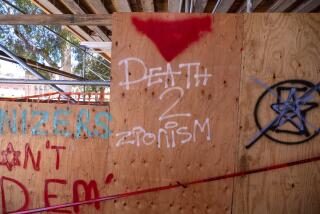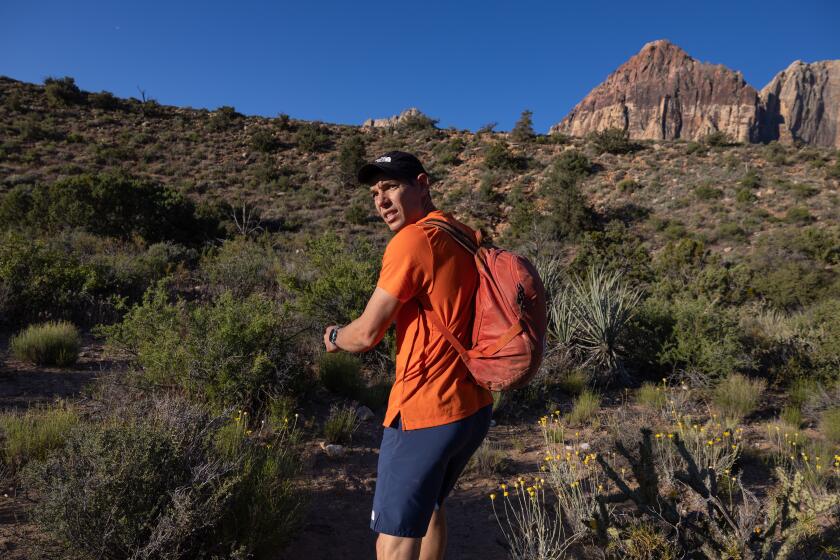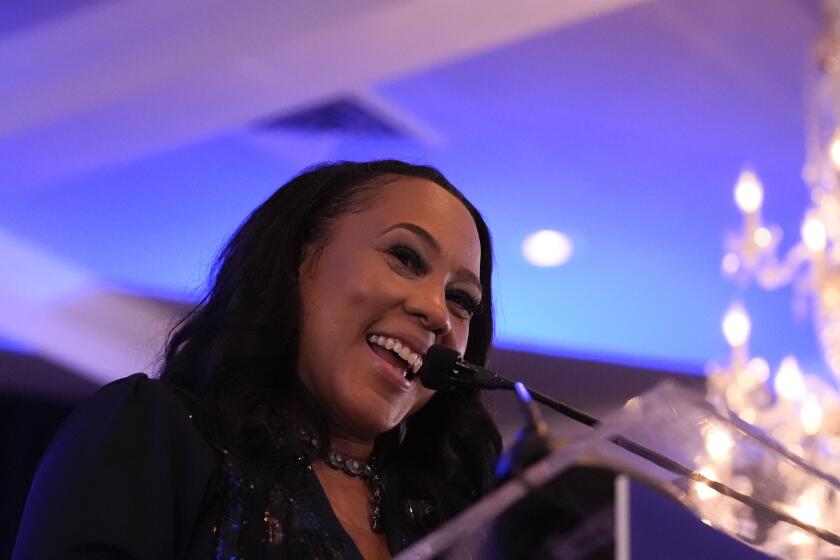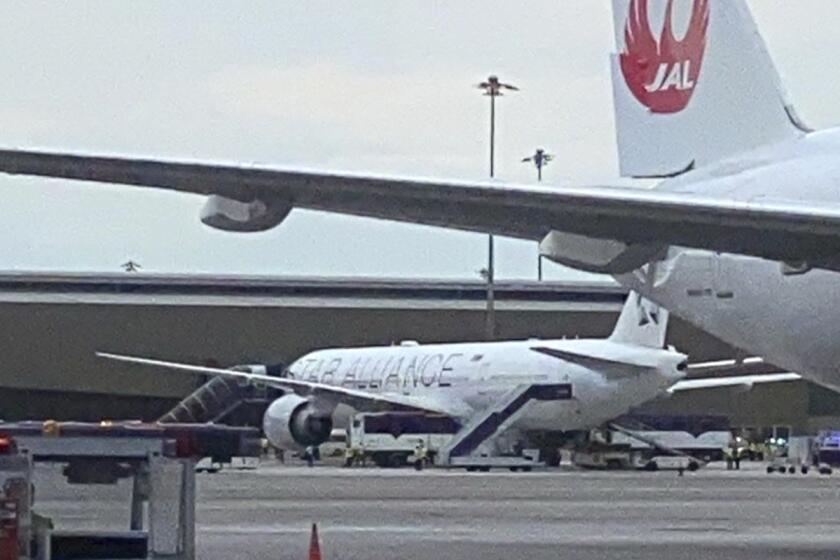Video Shows 3 Hostages; Fate of Fourth Unknown
Two Canadians and a Briton taken hostage last fall during their Christian peace mission to Iraq were shown Tuesday in a videotape on Al Jazeera television -- without the American colleague who was captured with them.
The mysterious turn in a 4-month-old hostage drama came on a day of sectarian violence that left at least 34 people dead and amid continued wrangling over who will lead the country. Interim Prime Minister Ibrahim Jafari, fighting to keep his job in the next government, declared on television that he “will not be subdued by blackmail.”
In Tuesday’s deadliest incident, police said they found the handcuffed bodies of 18 men in the back of a cargo truck abandoned on a roadside in Baghdad’s Amariya district, a Sunni Arab neighborhood. A doctor at nearby Yarmouk Hospital said the men, whose sectarian identities were unclear, had been tortured and shot to death.
Iraq and its leaders have been reeling from sectarian clashes that left several hundred people dead in the last week of February. There had been no sign in that period of the activists or of kidnapped American journalist Jill Carroll.
The video aired Tuesday was dated Feb. 28, a month after Qatar-based Al Jazeera telecast similar footage showing all four activists. The January video had been accompanied by a statement from the insurgent kidnappers giving U.S.-led forces what the captors called one last chance to free all Iraqi prisoners or the four men would be killed.
The hostages seen in the latest video were Briton Norman Kember, 74, and Canadians James Loney, 41, and Harmeet Singh Sooden, 32. They were shown sitting in chairs and speaking, although there was no audio. They appeared to be in good health.
Tom Fox, 54, of Virginia, abducted with them Nov. 26, did not appear in the footage, and his absence was not explained. A narrator on the tape said only that the men had asked their governments and Persian Gulf nations to work for their release.
“We do not know what to make of Tom Fox’s absence from this video,” said Jessica Phillips, a Chicago-based spokeswoman for Christian Peacemaker Teams, the organization that had sent the four men to Iraq.
A previously unknown group, Swords of Righteousness Brigades, had claimed responsibility for the kidnapping.
“We know the people who have got them are still trying to get some negotiating position from them and they haven’t put a deadline,” British peace campaigner Bruce Kent, a friend of Kember, told Britain’s Sky television Tuesday. “I am hopeful.”
Christian Peacemaker Teams has been working in Iraq since late 2002 and, since the U.S.-led invasion, has been investigating allegations of abuse against Iraqi detainees committed by American, British and Iraqi forces. In a statement Tuesday, the organization said 14,600 Iraqis are “detained illegally by the Multinational Forces.”
Tuesday marked two months since Carroll’s abduction and the slaying of her interpreter. The journalist’s captors, calling themselves the Revenge Brigades, have demanded the release of female detainees in Iraq in exchange for her life.
The Christian Science Monitor, which published the 28-year-old freelancer’s dispatches from Baghdad, placed a 90-second ad on Iraqi state television Tuesday appealing for her release.
Sunni and Shiite Muslims continued to attack each other’s mosques Tuesday. Men with guns and grenades ambushed a Sunni mosque in western Baghdad, killing a guard and setting two rooms ablaze. They fled after a gun battle in which five police officers were wounded.
A mortar shell wounded a worshiper leaving dawn prayers at a Shiite mosque in the same neighborhood.
Three other mortar shells hit the Baghdad headquarters of the National Dialogue Front, a leading Sunni political group, but no casualties were reported.
Car bombs killed three civilians in Baghdad’s Sadr City, a Shiite slum. Elsewhere in the capital, a blast occurred near a U.S. patrol. Four police officers were killed in attacks in the towns of Baqubah and Bayji, north of Baghdad. Eight more people died in other attacks.
Iraq’s Defense Ministry said the army was investigating how a gunman had managed to assassinate Maj. Gen. Mubdar Hatim Hazya Dulaimi, a Sunni who commanded the 6th Division in Baghdad. The general was killed Monday by a single bullet to the head as he opened his car door, the ministry said.
The 6th Division had been struggling to prevent all-out sectarian warfare since the bombing of Samarra’s Golden Mosque, a Shiite shrine, on Feb. 22. The general’s slaying increased speculation that the army has been infiltrated by sectarian militia groups.
Under U.S. diplomatic pressure, Iraq’s political factions have been trying to negotiate the makeup of an inclusive government to help overcome sectarian violence and quell the insurgency. The talks stalled last week when Sunnis, Kurds and secularists joined in opposing Jafari’s renomination as prime minister by the main Shiite bloc, which won the most seats in the parliament elected Dec. 15.
Sunnis have blamed the 59-year-old Shiite physician for failing to control Shiite militiamen attacking their mosques and clerics. Kurds are angry because they believe Jafari is blocking a constitutional resolution of their claims to control the oil-rich northern city of Kirkuk.
In a televised news conference, Jafari suggested that the stalemate stemmed from a personal dispute with President Jalal Talabani, the Kurd at the center of the stop-Jafari movement.
“No one can make bargains with me by enlarging personal disagreements,” Jafari said. “Dr. Jafari will not be subdued by blackmail. Dr. Jafari is not violating the constitution.”
Political leaders on all sides have given up hope of agreeing on the makeup of a government before Sunday, the day the new parliament is constitutionally required to hold its first session and elect a speaker.
Talabani has insisted that the session be held on time; Jafari’s Shiite faction wants a delay.
Times staff writers Shamil Aziz and Raheem Salman and special correspondent Asmaa Waguih contributed to this report.
More to Read
Start your day right
Sign up for Essential California for news, features and recommendations from the L.A. Times and beyond in your inbox six days a week.
You may occasionally receive promotional content from the Los Angeles Times.






